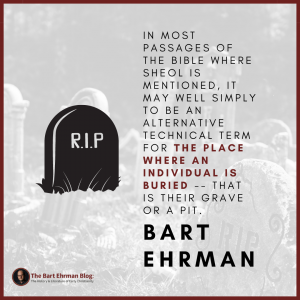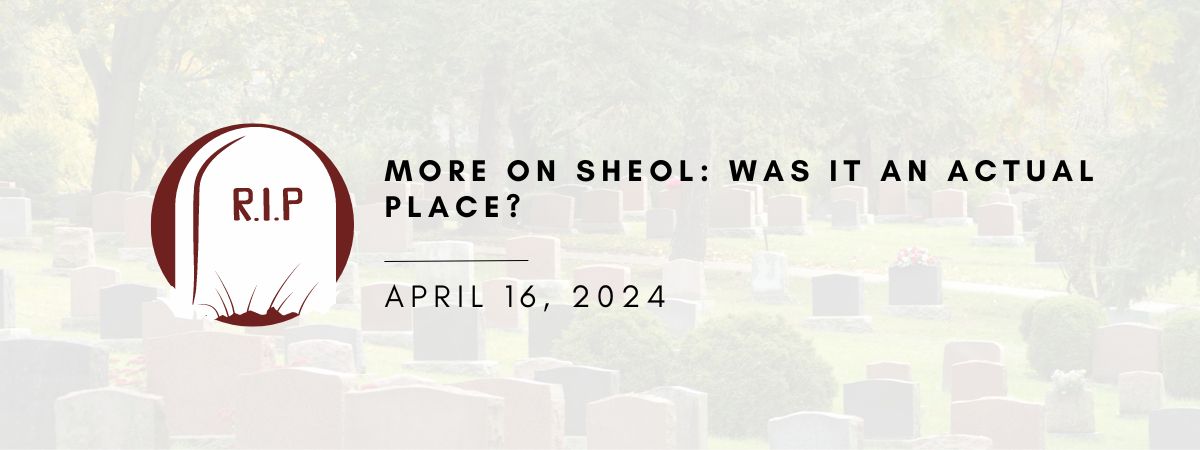The Jewish scriptures contain a variety of different views about what happens to a person at death. Most commonly, a person who dies is simply said to have gone to “death” – a term used some thousand times in the Bible. Better known, but far less frequent, a person’s ultimate destination is sometimes called “Sheol,” a term whose meaning and etymology are debated. It occurs over sixty times in the Hebrew Bible, and there is unanimity among critical scholars that in no case does Sheol mean “hell,” in the sense people mean today. There is no place of eternal punishment in any passage of the entire Old Testament. In fact – as comes as a surprise to many people – nowhere in the entire Hebrew Bible is there any discussion at all of heaven and hell as places of rewards and punishments for those who have died.
Probably most people who read the Bible think of Sheol as a Jewish kind of Hades, a shadowy place where everyone goes and all are treated the same, a banal and uninteresting netherworld where nothing really happens and people are, in effect, bored for all eternity. But in fact, in most passages of the Bible where Sheol is mentioned, it may well simply to be an alternative technical term for the place where an individual is buried — that is their grave or a pit.
This can be seen throughout the poetic books of the Hebrew Bible, such as the Psalms, where most of the references to Sheol can be found. To make sense of what I want to say about the matter, it is important to recognize a significant literary feature of Hebrew poetry. Poetry in books such as Psalms, Proverbs, Job, and extensive passages of the prophets did not use rhyming schemes as in much English poetry. Instead of rhyming “sounds” at the end of lines, Hebrew poetry could be said to have rhymed “ideas.” There were various ways a poet could set up an idea-rhyming scheme, but the most common was to express the same idea in parallel lines, using different words. In this scheme, the second line simply rephrases the idea of the first. You can see this use of “synonymous parallelism” throughout any poetic section of the Hebrew Bible. Consider some verses from Psalm 2, for example.
Why do the nations conspire
and the peoples plot in vain? (Ps. 2:1)
As you can see, the second line reinforces the first by restating the idea in different words, with possibly a slight amplification: Nations/people; conspire/plot. So to next lines:
The kings of the earth set themselves,
and the rulers take counsel together…
[But] He who sits in the heavens laughs;
the LORD has them in derision. (Ps. 2:2, 4)
Thus in parallel lines we have kings/rulers; set themselves/counsel together; He who sits in the heavens/the LORD; laughs/has them in derision.
I want to stress this point because it is a key to interpretation of Hebrew poetry. In synonymous parallelism, the ideas of the two lines are fundamentally the same, even when put in different words. And that is significant for understanding how the Israelite poets understood “Sheol.” It is often parallel precisely to terms such as “pit” and “grave,” the place where the body is buried. In these places it does not appear to be used to refer to a gathering spot for souls destined for eternal banality. For example, in one place the Psalmist thanks God for preserving him from premature death:
For you do not give me up to Sheol
or let your faithful one see the Pit. (Ps. 16:10)
Another place provides a reflection on the foolish who do not obey the LORD:
Like sheep they are appointed for Sheol;
death shall be their shepherd;
Straight to the grave they descend…
Sheol shall be their home. (Ps. 49:14)
Here the synonyms for Sheol here are “death” and “the grave.”
I do not want to insist that every ancient Israelite author thought of Sheol simply as the burial place for a corpse. Some may well have extended the idea into a broader metaphor as the “place” that people go.[1] And so some of the Patriarchs of Israel talk about “going down to Sheol” (e.g. Gen 37:35; 42:38); and a rebellious band of Israelites is swallowed up by the earth and taken down, while still alive, to Sheol (Num 16:30-33). It is certainly possible that some of these authors were imagining Sheol as an actual holding pen for the dead, a pen never to be escaped. On the other hand, these uses were perhaps all meant to be metaphorical, simply to refer to the fact that people die and are buried: hence they “go down.”[2]
[1] There are indeed some passages of the Hebrew Bible that may be read this way, where Sheol is imagined as an actual place of residence (see, for example, Isaiah 14:9-11; Ezekiel 31:15-17; 32:21). [I owe this insight to my colleague Joseph Lam, who has, despite my resistance, convinced me]. But these passages are all highly symbolic and metaphorical – not descriptions of what the authors thought was a literal reality.
[2] See the preceding note. It should not be objected that since the Patriarchs were buried in caves they did not actually go down . We often use directional terms metaphorically, such as when we say we are going downtown. “Going down” was itself simply a metaphor based on the normal procedures for burial.
You must be logged in to post a comment.Share Bart’s Post on These Platforms
6 Comments
Leave A Comment









I am sure you have done it before on the blog but please could you give the reasons why you do not believe the Transfiguration was the fulfilment of the imminent appearance of the kingdom of God. Please could you say why the Transfiguration does not satisfy the idea of ‘in power’.
For one thing, it doesn’t make sense of the saying abuot the kingdom of God coming in power, since that saying is that “some of you will not taste death before they see the kingdom of God coming in power.” Why would he say that “some” of them won’t die first if the very next thing he does is reveal himself to three of them? None of them will die first, in that sequence of events. The saying presupposes there will be a passage of time and some of them will die before it comes. But the kingdom of God did not come at the transfiguratoin. Jesus talks about the kingdom as coming on the Day of Judgment when God’s enemies will be destroyed, when others will be saved and enter into a new form of existence (many will come from east and west who will eat with th epatriarchs in the ocming kingdom, e.g.; it will involve teh coming of the Son of Man; none of that happened at the transfiguration.)
Hi, Bart,
Are Robert J. Miller’s books on Jesus and the Gospels a good read?
Thanks
I have to admit, the only book of his I know is The Complete Gospels. It isn’t a study of the Gospels but a collection of ancient Gospel writings (comparable to the book I did with Zlatko Plese, The Other Gospels) I’ve never quite understood why it’s called the “Complete” Gospels; I believe it includes a selection of non-canonical works, only through the second century. (Maybe I’m wrong about that?) The one we did has virtually all the gospels of the first four hundred years in Greek, Latin, and Coptic (in trnaslation!) with introductions to each.
Prof Ehrman,
I have a nagging suspicion most of the Biblical writers (certainly Jesus in almost all of his parables and possibly his coming kingdom talk) were speaking in metaphors, albeit in colorful and often fantastic terms, to make their points about major events, though not supernatural as such. In Daniel, for instance, the “one like a son of man” part, to my mind, suggests God’s kingdom will be characterized by its humanity…a final stage wherein we’ve overcome our beastly qualities and redeemed ourselves. Perhaps, in this vein, some of the Jews understood resurrection of the righteous as less a literal physical return (though I guess Paul did) than being remembered for their righteousness and emulated*. By that token, is Matthew 27:52 really meant to be taken literally?
*Likewise, when Jesus called John the Baptist ‘Elijah’, was he speaking of a literal reincarnation or John’s qualities resembling those of Elijah (&implying, in relation to John, his role being Elisha’s)?
I thought it was pretty well established Jews didn’t believe in spirit apart from body, but are you saying here there were exceptions when it came to Sheol as a place where they continued as conscious beings, despite their bodies somehow being dead?
No, I’m saying that Jesus and other Jews of his day did not believe in a conscious existence outside the body at death. Sheol was the grave the remains are placed into.